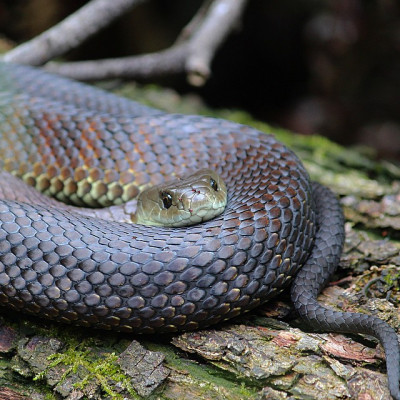
In Wyndham, the most common snakes are the Tiger Snake, Eastern Brown Snake and the Little Whip Snake. The Tiger Snake is the most common snake in suburban areas, especially near water and more vegetated areas such as creeks, wetlands and native bushlands.
Snakes play an essential role in maintaining a balanced food web within our natural ecosystems, they are both predator and prey. They play a significant role in controlling populations of mice and rats and are a food source for many birds of prey.
How can I stop snakes from entering my property?
Unfortunately, there is no sure way of completely preventing snakes from moving onto your property, but to reduce the chance, preventative measures can be taken:
- Keep grass and vegetation short and tidy.
- Do not have piles of wood, tin or tiles near the house.
- Remove all rubbish and debris.
- Keep aviaries free of spilled seed which will attract mice.
If you find a snake on your property:
- Watch it from a safe distance and do not touch the snake.
- Safely remove any people or pets from the area where the snake is.
- If the snake is visible, a qualified professional snake catcher engaged by Wyndham City can attend and remove the snake from the residential property. This service is free of charge to residents and can be accessed by phoning 1300 023 411, following the prompts if you call after business hours.
- If residents choose to contact a snake removalist independently without going through Council, residents will be responsible for any cost incurred.
Wyndham City will not send a snake catcher in the following circumstances if:
- The premises is industrial or commercial.
- The location of the snake is unknown.
- The snake was last sighted 30 minutes before the call.
- The property is unattended.
- The call is for a property where the resident/occupier is not at home.
- The snake is in open public space e.g. along the Werribee River and there is no immediate threat to the community.
- Snakes in wetlands – it is illegal to remove snakes from their natural habitat.
- Bluetongue lizards.
Snake safety for your pet
- Keep cats indoors.
- While out walking your dog, keep them on a lead.
- Stay on paths where snakes are move obvious.
- Don’t allow pets to explore long grass or dig in groundcover. If your pet seems unusually interested in something hidden in the grass, back off until you know what it is.
- If your pet is bitten by a snake, seek immediate veterinarian assistance.
Steps to avoid snake bites:
It’s important to remember that snakes are naturally shy animals, wary of predators including humans. They will react defensively if cornered or caught off-guard and will often flatten their necks to appear larger when threatened. To avoid snake bites, use common sense and:
• Wear sensible clothing – closed toe shoes, socks and jeans are usually adequate.
• Never reach into or under hollows, logs or thick grass without looking first.
• Stay on footpaths when enjoying Wyndham’s natural areas and open spaces.
• Watch where you are walking and supervise young children and pets.
Snakes are a native animal and are protected under the Wildlife Act 1975. It is illegal to capture, harm or kill these protected species.